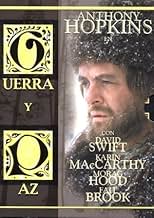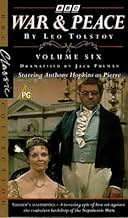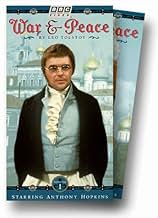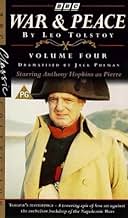As relações tumultuadas de Napoleão com a Rússia, incluindo sua desastrosa invasão de 1812, servem de pano de fundo para a vida pessoal emaranhada de cinco famílias aristocráticas russas.As relações tumultuadas de Napoleão com a Rússia, incluindo sua desastrosa invasão de 1812, servem de pano de fundo para a vida pessoal emaranhada de cinco famílias aristocráticas russas.As relações tumultuadas de Napoleão com a Rússia, incluindo sua desastrosa invasão de 1812, servem de pano de fundo para a vida pessoal emaranhada de cinco famílias aristocráticas russas.
- Indicado para 1 Primetime Emmy
- 2 vitórias e 1 indicação no total
Explorar episódios
Avaliações em destaque
10jeffws
I don't have much to say in addition to the adulations given by, especially, those who watched this amazing series at a young age. I was 23 when it first broadcast on public television, a co production of the BBC and Time-Life. I disagree with the verbose UK reviewer above, who felt the episodes boring until about halfway. I was intrigued with episodes 1 and 2, and utterly engrossed by 3, waiting impatiently for the following week to bring the next episode. My only problematic observation from the 1st episode was that it seemed a little stagy, as if I were watching a stage play. Small criticism. Watching it again 37-odd years later ( have finished the 2nd DVD as I write this) I was again engrossed, with the advantage of not having to wait a week for the next episode! The only proper and accurate adaptation to the great novel.
Considering this a television production, I was again impressed (and surprised) by the ambition and quality of the battle scenes. It was refreshing not see an exaggerated CGI army battling another CGI army. My favorite actors were Alan Dobie and a young Anthony Hopkins. Every time I see Hopkins in a movie, I immediately remember his outstanding performance as Pierre. The one scene I always remember is Alan Dobie ad Prince Andre, lying in the battlefield after being wounded while leading a futile charge at Austerlitz, lying on the ground, staring up at the sky and remarking about it, that all is vanity, illusion.
Finally, how can one forget Fiona Gaunt as Helene? Wow, those low-cut empire-style gowns. I kept fearing (if that is the word) that she wouldn't be able to "contain" herself. (Sorry for the moment of male levity).
My all-time favorite British TV production, even slightly ahead of the wonderful Upstairs, Downstairs.
P.S. Thanks to the viewer who pointed out that it was not shown on Masterpiece Theater. I always remembered that it was, and was regretting that Alistair Cooke's introductions and final comments were missing from the DVD. Now I know that they were not! But how I wish they were!
Considering this a television production, I was again impressed (and surprised) by the ambition and quality of the battle scenes. It was refreshing not see an exaggerated CGI army battling another CGI army. My favorite actors were Alan Dobie and a young Anthony Hopkins. Every time I see Hopkins in a movie, I immediately remember his outstanding performance as Pierre. The one scene I always remember is Alan Dobie ad Prince Andre, lying in the battlefield after being wounded while leading a futile charge at Austerlitz, lying on the ground, staring up at the sky and remarking about it, that all is vanity, illusion.
Finally, how can one forget Fiona Gaunt as Helene? Wow, those low-cut empire-style gowns. I kept fearing (if that is the word) that she wouldn't be able to "contain" herself. (Sorry for the moment of male levity).
My all-time favorite British TV production, even slightly ahead of the wonderful Upstairs, Downstairs.
P.S. Thanks to the viewer who pointed out that it was not shown on Masterpiece Theater. I always remembered that it was, and was regretting that Alistair Cooke's introductions and final comments were missing from the DVD. Now I know that they were not! But how I wish they were!
Someone posted a while back that this mini-series aired on PBS' "Masterpiece Theatre" in the 1970's. This is an error. The series did indeed air on PBS via NYC's station WNET. "Masterpiece Theatre" is presented by Boston's WGBH and "War and Peace" was NOT aired under the MT banner.
Anthony Hopkins stars in the role that brought him to my attention, that of Pierre Bezukhov. He gives a rendition of Pierre that is very convincing, and takes the character through an education that is far from sentimental, though it is very moving.
The depth of the novel is brought out by the length of the mini-series, which I saw on PBS' Masterpiece Theatre in the early 1970's. It is well shot, with wide open vistas that do some justice to the Russian countryside. The portrayal of Russian country life and its glittering high society of the cities is most convincing.
The performances beyond that of Hopkins are also quite strong. Very affecting was Alan Dobie as Prince Bolkonsky. The whole effort deserves 10 out of 10.
The depth of the novel is brought out by the length of the mini-series, which I saw on PBS' Masterpiece Theatre in the early 1970's. It is well shot, with wide open vistas that do some justice to the Russian countryside. The portrayal of Russian country life and its glittering high society of the cities is most convincing.
The performances beyond that of Hopkins are also quite strong. Very affecting was Alan Dobie as Prince Bolkonsky. The whole effort deserves 10 out of 10.
There are at least three major filmed versions of the epic, sprawling Tolstoy masterpiece, and each offers particular pleasures. The King Vidor version made for Hollywood is short; otherwise, it offers a miscast Henry Fonda and a wistful Audrey Hepburn, who while lovely indeed, is out of her depth in a deeply tragic story. The Russian version which clocks in at somewhere about eight hours has lavish spectacle going for it, huge amounts of staged battle sequences which boggle the mind--and done without the use of CGI;its drawback is an often confusing script and, for contemporary English and American audiences, an over-the-top, occasionally hysterical acting style. This version is fifteen hours long and I found it followed the book carefully, and is loaded with fine performances, particularly Anthony Hopkins as the confused Pierre, bumbling through life in search of some spiritual catharsis; there are numerous other roles that become memorable from actors not familiar to most of us, and only Napoleon comes up short in a lackluster, thudding performance. Because this version was for BBC and not the movies, it looks a little spare now and then, but once the rhythm was set, I found it compelling and hugely satisfactory.
I remember seeing this first when I was just 12. It definitely left an impact on me especially Alan Dobie's Prince. Also Natasha Rostova played by Morag Hood is a very interesting and free-spirited character. Ms. Hood has really brought natasha to life, so much so that sometimes you can't wait to watch what she's going to do next. The scenic backgrounds of Russia are beautiful and as always Anthony Hopkins dazzles in his rendition of Pierre. Anyone interesting in seeing a movie version of War & Peace must watch this and not the more recent versions (very dry and boring - would think it was shot in Texas). The scenes tend to linger in your memory..
Você sabia?
- CuriosidadesThis mini-series was filmed in the former Socialist Federative Republic of Yugoslavia, in the production of Avala Films.
- ConexõesReferenced in A Fita de Pedra (1972)
Principais escolhas
Faça login para avaliar e ver a lista de recomendações personalizadas
- How many seasons does War & Peace have?Fornecido pela Alexa
Detalhes
- Data de lançamento
- País de origem
- Central de atendimento oficial
- Idiomas
- Também conhecido como
- Krieg und Frieden
- Locações de filme
- Bela Crkva, Sérvia(French-occupied Moscow)
- Empresas de produção
- Consulte mais créditos da empresa na IMDbPro
Contribua para esta página
Sugerir uma alteração ou adicionar conteúdo ausente

Principal brecha
By what name was War & Peace (1972) officially released in India in English?
Responda
































